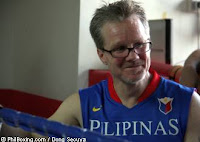
Not many knew it, but famous boxing trainer Freddie Roach started his athletic career as trackster – a miler to be exact where he attested he was good at.
“I’m a good miler and had some good records where I was raised and raced,” he told this writer in an interview during a lull in Manny Pacquiao’s training in Baguio City, adding that he also played football and baseball in school.
One of seven children of former fighter Paul Roach, the 1947 New England featherweight champion, Freddie and four of his siblings would turn to boxing though at the behest of their father.
“I turned out to be the best fighter in the house,” he said rather proudly. And he has records to speak well. He fought 150 fights, 141 of which he won, in his amateur days and was good enough, indeed, to make it into the United States Olympic boxing team trials.
Roach actually made it as alternate of the 1976 U.S, team to the Montreal Olympics, one of the best Olympic team ever as it also included professional legends Sugar Ray Leonard and the Spinks brothers – Leon and Michael.
Nicknamed “La Cucaracha” for reasons he would only smile when asked as well as “The Choir Boy,” Roach was born Martch 5, 1960 in Dedham, Massachusetts where he also grew up.
Now the chief cornerman of reigning pound-for-pound monarch Manny Pacquiao, Freddie is one of the best and most sought after trainers in the sport.
But life for the respected pugilistic guru isn’t exactly a dance at the prom. It never has been.
He had his first amateur fight at age six to help tide his family up and, at eight, had his first taste of actual competition on the way to becoming the national 55-kilogram champion.
Freddie turned pro in 1978 at the age of eighteen and went into semi-retirement 10 years later in compiling a record of 39-13 with 15 knockouts. Notable names on his resume include Hector Camacho, Greg Haugen and Bobby Chacon. He lost to all three.
At retirement, he had to do menial jobs to survive. The only job he knew was boxing and soon found himself back in the gym, this time as an assistant to renowned trainer Eddie Futch who had grown his legend in the corners of fighters such as Joe Frazier, Larry Homes and Ken Norton.
He later attributes his success as a trainer to Futch, who he described as a good teacher.
“I learned all the ropes in teaching to fight from my 10-year stint as his understudy,” he said, adding though that he is fortunate enough to having good fighters, too, citing Pacquiao as his most prized ward.
La Cucaracha eventually nailed up his own shingle and currently owns the Wildcard Boxing Club in Los Angeles where he trains Pacquiao and thirteen others, including newly-crowned World Boxing Association junior-welterweight champion Amir Khan.
Pacquiao and Khan are only two of the 26 world champions who fought under his wings, including legendary Oscar De La Hoya, one of the Filipino icon’s latest victims, and soon-to-be rival Floyd Mayweather Jr., James Toney, Mike Tyson, Michael Moorer, and Bernard Hopkins, among many others.
He has also begun working with mixed martial arts fighters as the boxing trainer to UFC stars Anderson Silva and Andrei Arlovski.
He was named Trainer of the Year three times by the Boxing Writers of America and has been enshrined in the World Boxing Hall of Fame.
While it is his boxing background that has led him to his current success and the status which accompanies it, it is that same background which has caused him his greatest suffering. He has Parkinson’s disease, which was caused either fully, or in part, by his life in the ring.
As a result, he has difficulty walking, slightly slurred speech and general physical awkwardness. Medication has helped but he also combats the disease with exercise and a proper diet.
Not only is he a master of fight strategy and preparation, but his battle with Parkinson’s has also made him highly sensitive to the well being of the boxers in his charge. When he sees the signs of impending ring damage in his fighters, he tells them, advises them to seek medical attention and then stops training them.
Life with Parkinson’s is a daily battle for Freddie. But he’s a fighter and always has been. It’s how he was raised.
“Some people look at me and feel sorry for me and I can’t understand it. I love my life,” says Roach.
And judging by the roll he’s on, life apparently loves him as well. Roll on Freddie.
Source: http://philboxing.com/news/story-28740.html








No comments:
Post a Comment
Note: Only a member of this blog may post a comment.